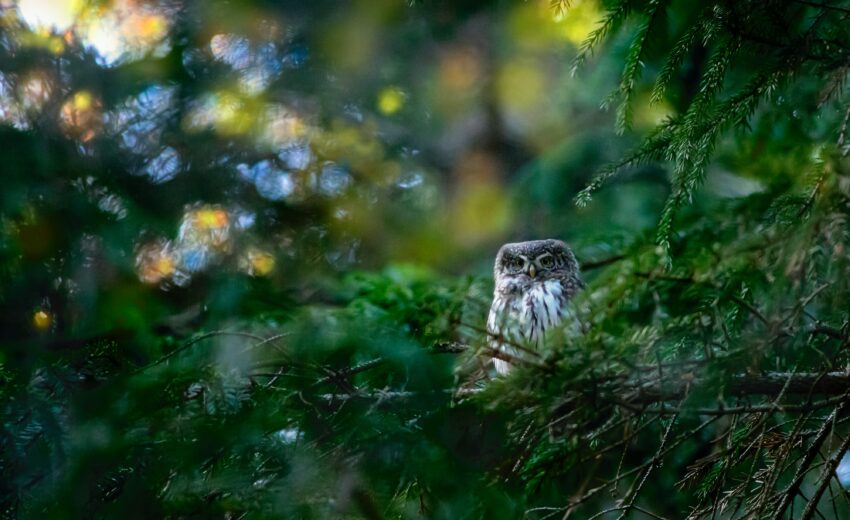
This article was originally published in the Summer 2023 Humanistic Judaism Magazine. It was written by Rev. Marti Keller, a Unitarian Universalist minister, past president of Unitarian Universalists for Jewish Awareness, and member of the Society for Humanistic Judaism. She is a published poet and was poet in residence for the 50th anniversary of the National Wilderness Act.
In my more than two decades as a traveling speaker, housed in made-over basements and tiny guest rooms and pool houses, it has always been critical for me to find ways and places to walk — and not just in city blocks, but in wilder locations. For example, such as the extended time I spent in Blacksburg, 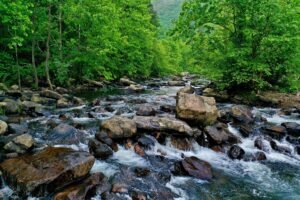 Virginia and was taken to nearby Brown’s Farm: its rolling pasture, its gliding hawks, permanently protected from subdivisions and soccer field. And there was the New River, with passable bass fishing and Friday night undergrad beer parties, but also secluded banks from which you can just watch this long stream meander or rush, depending on the rapids.
Virginia and was taken to nearby Brown’s Farm: its rolling pasture, its gliding hawks, permanently protected from subdivisions and soccer field. And there was the New River, with passable bass fishing and Friday night undergrad beer parties, but also secluded banks from which you can just watch this long stream meander or rush, depending on the rapids.
This is to be — for a little while each day — a spiritual naturalist, an eco-feminist, participating, at least spiritually, in reweaving the world.
And here and there, identifying a common bird.
To be a Jewish person in nature defies some old stereotypes and self-concepts among those of us who are just one or two generations away from cobbled ghettos and crowded tenements or from great grandfathers who spent hours davening (praying) in cramped schuls (houses of worship) — or huddled over their Hebrew bibles and their Talmuds, engrossed in scripture from morning til night.
My father’s father came from a small town in Ukraine, adjacent to the great swaths of Tsvetukha Forest. It was always a resort area, then and now, but rarely visited, I was told, by his family or other Jews.This was also the site of slaughter by Nazi soldiers and locals in the middle of World War 11.
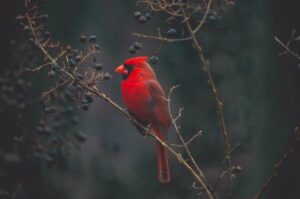 It took my father’s restlessness and curiosity to break into the natural world, when as a teenager he would
It took my father’s restlessness and curiosity to break into the natural world, when as a teenager he would
take the MTA in Boston from Dorchester to Boston Commons, in search of urban wildlife, not just the ducks and shorebirds, but the neighborhood permanent avian residents and the migratory flocks.
He spent the rest of his life “hunting without guns,” as he would tell his hundreds of birding students, rising at dawn and out the door, the best time to capture the sights and sounds, collecting a world-class life list of spotted species, attracting novices to his Intro to Ornithology or bird study classes at Emory University.
He knew his bird facts and figures, but it was his mystical connection with birds that kept people flocking to him. He was like a Pied Piper. When he sounded a bird call, they would come, and he would fill a tree with birds. He could often tell a bird by a single chip, just as he was known to hear a single bar of classical music and tell the piece it came from.
My father’s religion of origin was the kind of Judaism where his mother kept a kosher kitchen, and there were barebones observance of Shabbat and the holy days. He was also a nearly lifelong atheist, a cultural Jew who could break out into basic Yiddish to tell a joke or a story, and who loved borscht and chicken feet.
He dropped out of attending first Unitarian services and later Ethical Culture, to free up his Sunday mornings for bird-watching excursions. If there is a descriptor of my father’s spirituality — which for me as well means being concerned about and connected to the essence of life — what Socrates called “an examined life,” it would be spiritual naturalism. Spiritual naturalism is described as a worldview, value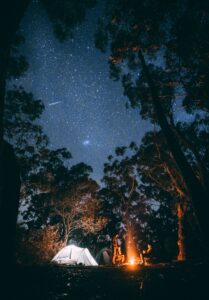 system, and personal life practice that sees the universe as one natural and sacred whole, as is the rationality and science through which nature is revealed. It is the awe and mystery we experience when we observe or have other direct experiences in nature. Even experiences that on the surface make no sense can be meaningful, like the majestic, but also frightening Barred or Hooting Owl that followed my husband and me a few days after my father died through a patch of urban woods … or the unexplainable accuracy with which I spotted and identified birds only once in my life, on an in memoriam bird walk I took.
system, and personal life practice that sees the universe as one natural and sacred whole, as is the rationality and science through which nature is revealed. It is the awe and mystery we experience when we observe or have other direct experiences in nature. Even experiences that on the surface make no sense can be meaningful, like the majestic, but also frightening Barred or Hooting Owl that followed my husband and me a few days after my father died through a patch of urban woods … or the unexplainable accuracy with which I spotted and identified birds only once in my life, on an in memoriam bird walk I took.
For those among us who either grew up within Judaism and have moved away entirely, or like most of us, still retain and observe some of the usual practices and holy days, the High Holy Days may be filled with memories of being (confined) within a synagogue, indoors, for many hours.
Rabbi Mike Comins, founder of Torah Trek, promoting the connection between Judaism and nature, tells a very different story about the celebration of the Jewish New Year. He described a day in September 1996 when he was camped snugly, as he writes, in his book, Wild Faith, “against the cliffs of a canyon in the desert mountains above the Israeli city of Eilat,” wrapped in the early morning cold in his tallit, his prayer shawl, he listens to the birds for inspiration, feeling fully exposed. Far from humans, he remembers, his heart sheds its burdens, his prayers of atonement and teshuvah — turning towards the good, turning his life around — flow.
He must overcome a stereotype that even secular Jews are wilderness rejects, as he writes, that Jewish things are done in a city and under a roof. The assumption is that wisdom comes from books and insights from a mind need not be exposed to fresh air, to wondrous natural places, or to other living things.
My brilliant, voraciously reading, world-recognized microbiologist father would have loved the recently published book Awe: The New Science of Everyday Wonder and How It Can Transform Your Life by Dasher Kiltner. One of the chapters described the factual neurophysiology of wild awe, how what he calls regular healthy doses of awe-inspiring nature have proven huge health benefits, physical and emotional.
I am not and never will be the consummate birder my father and brothers were. I depend now entirely on the Merlin App on my phone to tell me, mostly from the calls and songs of birds, who they are and how amazingly rare a sighting. But I have still, over my seven decades plus of life — part of the time — composed a kind of Wilderness Jewish, Thoreau-leaning spiritual life. This, in some ways, has taken me full circle back to my childhood, where I escaped the storms in our cramped home and the dark corners of our neighborhood by spending some part of most days in the woods behind the houses across the street. It was a small remnant of Eastern forest (or even Southern Piedmont forest), with a grove of white birch and beech and red oak and maple trees. For me, it was a haven — sometimes slippery, with patches of poison ivy, with biting insects, with burrs and nettles. But despite these slight and even delicious dangers, it made me feel safe and secure. There were Jack-in-the-Pulpits that companioned me. This is where I could find my strength — feel totally myself and totally at one with the life that fills and surrounds me.
What I have gained is inspiration.
What I have gained is the experience of the interconnected web of all existence.
What I have gained is the awe I can find right in front of me.
Citations and additional resources to accompany this articlecan be found at: bit.ly/HJ-Summer2023
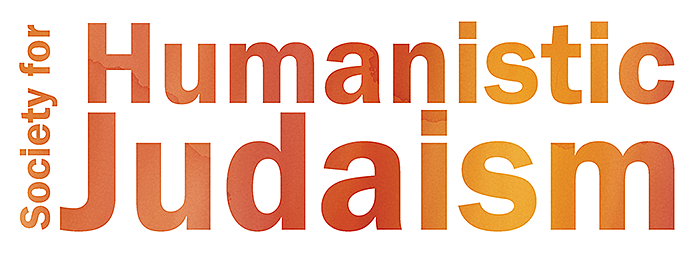


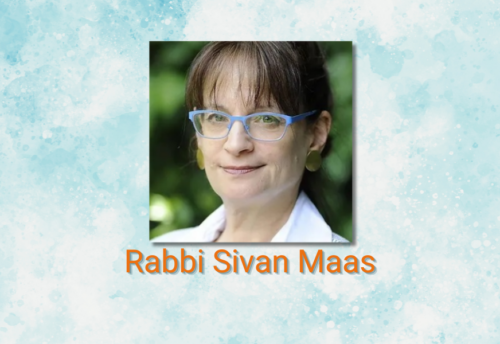
Leave a Reply